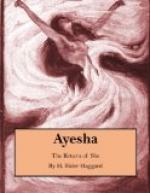Such was our introduction to the Monastery of the Mountains—for it had no other name—where we were destined to spend the next six months of our lives. Within a few days—for they were not long in giving us their complete confidence—those good-hearted and simple old monks told us all their history.
It seemed that of old time there was a Lamasery here, in which dwelt several hundred brethren. This, indeed, was obviously true, for the place was enormous, although for the most part ruined, and, as the weather-worn statue of Buddha showed, very ancient. The story ran, according to the old abbot, that two centuries or so before, the monks had been killed out by some fierce tribe who lived beyond the desert and across the distant mountains, which tribe were heretics and worshippers of fire. Only a few of them escaped to bring the sad news to other communities, and for five generations no attempt was made to re-occupy the place.
At length it was revealed to him, our friend Kou-en, when a young man, that he was a re-incarnation of one of the old monks of this monastery, who also was named Kou-en, and that it was his duty during his present life to return thither, as by so doing he would win much merit and receive many wonderful revelations. So he gathered a band of zealots and, with the blessing and consent of his superiors, they started out, and after many hardships and losses found and took possession of the place, repairing it sufficiently for their needs.
This happened about fifty years before, and here they had dwelt ever since, only communicating occasionally with the outside world. At first their numbers were recruited from time to time by new brethren, but at length these ceased to come, with the result that the community was dying out.
“And what then?” I asked.
“And then,” the abbot answered, “nothing. We have acquired much merit; we have been blest with many revelations, and, after the repose we have earned in Devachan, our lots in future existences will be easier. What more can we ask or desire, removed as we are from all the temptations of the world?”
For the rest, in the intervals of their endless prayers, and still more endless contemplations, they were husbandmen, cultivating the soil, which was fertile at the foot of the mountain, and tending their herd of yaks. Thus they wore away their blameless lives until at last they died of old age, and, as they believed—and who shall say that they were wrong—the eternal round repeated itself elsewhere.
Immediately after, indeed on the very day of our arrival at the monastery the winter began in earnest with bitter cold and snowstorms so heavy and frequent that all the desert was covered deep. Very soon it became obvious to us that here we must stay until the spring, since to attempt to move in any direction would be to perish. With some misgivings we explained this to the abbot Kou-en, offering to remove to one




